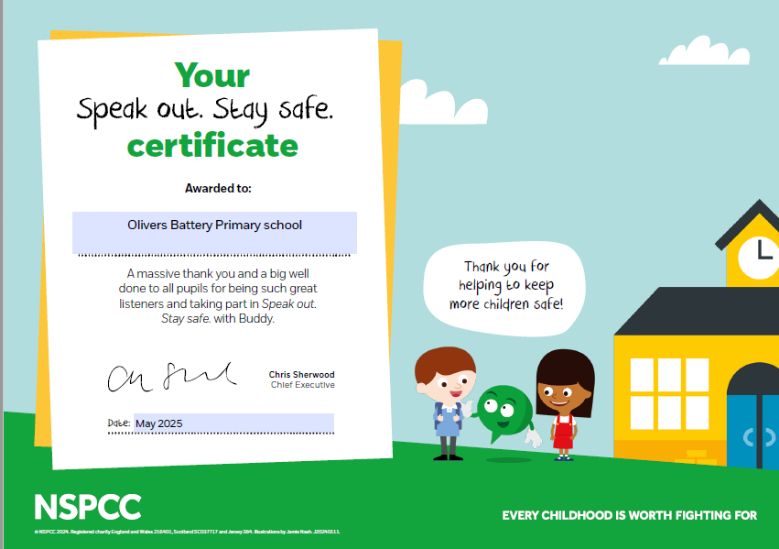PSRE, Health Education & Mental Health
Intent
At Oliver’s Battery Primary and Nursery School, we recognise that Personal, Social, Health and Relationship (PSRE) education is fundamental to the holistic development of our children. Our intent is to ensure that all pupils develop the necessary knowledge, skills, and attributes they need to keep themselves healthy and safe, and prepare them for life and work in modern Britain.
We aim to:
· Promote Well-being: Foster the emotional, mental, and physical well-being of our pupils, ensuring they feel valued, accepted, and understood.
· Cultivate Respect: Encourage respect for oneself and others, thereby nurturing a strong sense of community and belonging.
· Teach Life Skills: Equip children with practical skills and knowledge to manage everyday challenges, understand their emotions, and make informed decisions.
· Foster Resilience: Develop resilience and self-esteem, enabling our pupils to face setbacks with a positive outlook.
· Engage with Diversity: Instill an appreciation of cultural diversity and British values, by teaching pupils to understand and embrace differences within our community and beyond.
Implementation
Our implementation of PSRE is thoughtfully designed to integrate across the curriculum and is delivered through a combination of dedicated curriculum time, cross-curricular opportunities, and extracurricular activities.
1. Curriculum Design:
a. We follow a structured PSHE programme that aligns with the statutory guidance from the Department for Education and the PSHE Association, addressing the needs of our pupils. This is adapted to ensure inclusivity and accessibility for all.
b. Topics are organised into clear themes: Health and Well-being, Relationships, Living in the Wider World. These are revisited and expanded upon as children progress through their schooling.
2. Teaching Methodologies:
a. We use engaging, child-centred approaches that encourage oracy, active participation, including role plays, discussions and collaborative projects.
b. We encourage pupils to share their thoughts and experiences in a safe environment, promoting effective communication skills and emotional literacy.
3. Assessment and Evaluation:
a. We regularly monitor ongoing formative assessment, allowing staff to understand pupils' current knowledge and attitudes. This informs adjustments to teaching approaches to meet the diverse needs of our children.
b. Twice yearly, we hold feedback sessions with pupils to gather their perspectives on the PSRE curriculum and its impact on their lives.
4. Partnerships:
a. We collaborate with external agencies and organisations to enrich our curriculum, such as local health services, charities such as MyBank, and community groups. We are particularly proud to be a MyHappyMind school.
b. We engage parents and carers in PSRE education by providing workshops and resources, such as parenting and online safety courses, ensuring a cohesive approach to supporting children's learning and well-being.
Impact
The impact of our PSRE programme is evident in the behaviour, attitudes, and achievements of our pupils. By nurturing a strong PSHE foundation, we ensure that our children are only academically prepared whilst being socially and emotionally prepared for their future.
1. Pupil Well-Being:
a. Surveys and feedback indicate that pupils value the PSRE curriculum and that they feel safe, supported, and equipped to handle challenges.
b. Improvements in mental health and resilience are in evidence through increased participation in school activities and reduced incidents of bullying.
2. Social Skills and Relationships:
a. Pupils demonstrate strong interpersonal skills, including empathy, teamwork, and respect for others, keeping our ‘Ready, Respectful, Safe’ ethos at the fore.
3. Civic Responsibility:
a. Our pupils show an understanding of their rights and responsibilities, demonstrating an understanding of the need to respect the law and participate actively in their communities, an example being our enthusiastic litter pickers who go out into the community to make Oliver’s Battery a better place.
b. Evidence of community engagement projects undertaken by pupils highlights their awareness of social issues and their desire to effect change, with children this year voting for a charity to support as a school.
c. The work we are doing around oracy will help to produce children who are able to use their voice to make a difference in the world.
4. Academic Engagement:
a. There is a correlation between the emotional and social competencies developed through PSRE and improvements in overall academic performance.
b. Pupil voice indicates that they find relevance in their learning, inspiring them to engage more deeply with their studies across different subjects.
In summary, our PSRE programme is rooted in a clear intent, is effectively implemented and demonstrates impact on the lives of the children in our care. We continually strive to improve and adapt our provision to meet the evolving needs of our children and community

